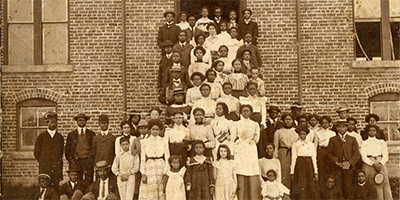Asked if the need for historically black colleges and universities has passed, Bennett College President Phyllis Worthy Dawkins fired right back.
“Well you know, you don’t ask that question of Catholic institutions, so I don’t know why we should be asked that question,” said Dawkins, who leads the United Methodist-related women’s college and historically African American school in Greensboro, North Carolina.
“We don’t need to go away, OK?”
But many small, rural liberal arts institutions are facing tough times — not just historically black schools. Cynthia Bond-Hopson, executive of the Black College Fundand Ethnic Concerns at the United Methodist Board of Higher Education and Ministry, said it’s an issue of which she’s very aware.
“I tell you, it’s not something that doesn’t keep me up at night. This is just a tough marketplace,” Bond-Hopson said. “Certain church-related schools are having a tough time.”

Bennett had a recent narrow escape. In danger of losing accreditation, school officials hurriedly raised $9.5 million in the six weeks between December and February, including $1 million from fellow United Methodist-related High Point University, also in North Carolina.
Still, that wasn’t enough, decided officials with the Southern Association of Colleges and Schools, who announced they still intended to remove accreditation from Bennett. The school lost an appeal on the issue, then filed a still-ongoing lawsuit against the accrediting organization. In the meantime, Bennett is pursuing accreditation with The Transnational Association of Christian Colleges and Schools.
Dawkins is confident accreditation will be earned either from SACS or TRACS, or both. In the meantime, Bennett retains SACS accreditation while the lawsuit continues.
Bond-Hopson said the issue is sustainability.
“They were able to raise all that money quickly, but I think the accreditors were concerned if they could keep that going and do that for the long run,” she said.
Paine College, in Augusta, Georgia, recently went through the same experience, and came out the other end with accreditations from SACS and TRACS, reported “Diverse Issues in Higher Education.”
“Paine College has had its challenges, but I’m prayerful they will weather their storm,” Bond-Hopson said. “Any time accreditors are unhappy, they make it pretty tough on the schools to keep the accreditation and move forward at the same time. If they can keep accreditation, they’ll be fine.”
Bennett is researching ways to rethink fundraising, use technology to be more efficient, and improve infrastructure. They have dropped some low-performing majors and are considering adding programs in cybersecurity, health sciences and birth-to-kindergarten education.
Bennett is not considering opening the college to men and is definitely not going to close or merge with other colleges or universities, she said.
Historically black colleges and universities are still needed because “they offer a culture of great expectations,” Bond-Hopson said. “What happens in our schools is that (students) get individual attention; they get encouragement and great expectations. You may never have lived into your greatness, but if you go to a black college, I think most of them have folks who are going to demand your best.”
excerpt of a story by Jim Patterson, UMNS reporter, Nashville, Tennessee
One of seven apportioned giving opportunities of The United Methodist Church, the Black College Fund provides financial support to maintain solid, challenging academic programs; strong faculties; and well-equipped facilities at 11 United Methodist-related historically black colleges and universities. Please encourage your leaders and congregations to support the Black College Fund apportionment at 100 percent.





